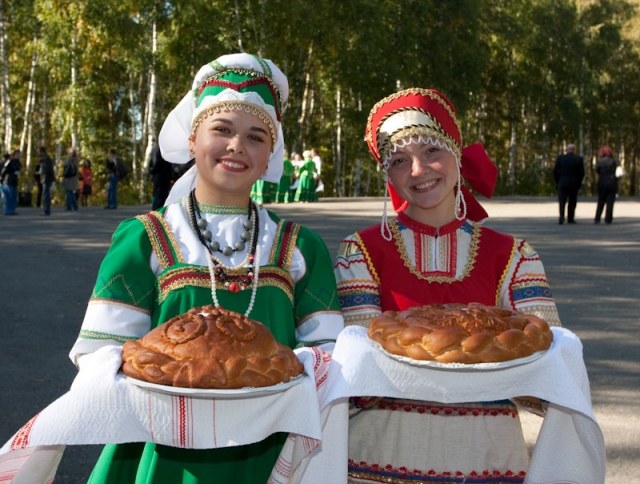Hospitality is a tradition
Russian people always differed hospitality. The attitude of the guest in Russia was special. Guests, even accidentally, was surrounded by honor and respect. It was believed that looking at the house the traveller has seen a lot in its path, knows a lot, he's got a lot to learn. And if the guest will enjoy a warm welcome, in his words the good reputation of the owner of the house and Rusi will spread around the world.
The main task of the host was considered the best possible way to feed the honored guest, he exhibited the best dishes. To have survived the sayings "What is in the oven, everything on the table swords, Though not rich, but happy guests", "guest of the soup I've got thicker pour".
If the forthcoming meeting of the guests were known in advance, then prepare started for a few days. It was the custom to greet dear guests at the door with bread and salt. Usually bread, necessarily laid on a clean towel (rushnyk), carried to the guests the hostess or the woman, hands that loaf was baked. The towel signified the road that did a guest. In addition, it symbolized God's blessing. Bread and salt were symbols of wealth and prosperity, and salt was attributed to the properties of the "talisman". To meet guests "bread and salt" means to call him God's mercy and add your good wishes and peace. However, guests can bring home bread and salt, expressing special respect for the master, and wishing him prosperity and wealth.
"Every traveler was for the Slavs as if sacred: it was met with kindness, treated with joy, accompanied with awe...", -
N. M. Karamzin.
Traditional Russian meal
If the house had guests, the meal began and went on in a specific scenario. The table, which is literally bursting with a variety of dishes, located in the "red corner" near stuck to the wall fixed benches. There was a belief that sitting on these benches shall enjoy the special protection of the saints.
Traditionally, in the beginning of the meal appeared the mistress of the house, dressed in your best outfit. She welcomed the guests of the earth bow. The guests bowed in response and at the suggestion of the owner came up to kiss her. According to established custom, each guest was handed the Cup of vodka. After "slovarnogo ceremony," the hostess went to a special women's Desk, which was the signal to start the meal. The owner cut each guest a piece of bread and sprinkled salt on it.
Attitude to bread was particularly anxious, he was considered the Foundation of well-being, was associated in the minds of the people with a long and hard work. Salt in those days was a very expensive product used only in special cases. Even in the Royal house of shakers was located closer to the king, and the most important guests. Besides, it was believed that salt wards off evil spirits. Therefore, to present bread and salt meant to share with a guest the most expensive, to Express their respect and at the same time to wish prosperity and goodness.
It is impossible to imagine Russian table without bread and salt, "no salt, No bread thin conversation", "Bread on the table, and the table — throne", "no Bread piece, and the tower longing, a bread edge, and under spruce Paradise", "Without bread — death, without salt laugh."
Refusing to share with the owners of the house "bread and salt", it was possible to inflict permanent hurt. During the meal was made hard to regale the guests. And if you didn't eat much, the owners tried to persuade them to enjoy a particular dish, kneeling.
Today, "bread and salt" meet
Our nation is still open, hospitable, welcoming. And the tradition to greet dear guests welcome not only in word but with bread and salt and preserved in our days. For example, in the wedding day mother of the groom presents young wedding loaf — a symbol of pure thoughts and good intentions. This means that parents adopt a young wife, which will now have to live together and to share all joys and troubles.
Of course, in pure form, a ceremony often used at official meetings or in a special celebratory moments. For example, a festive loaf meet the inhabitants of the city.
